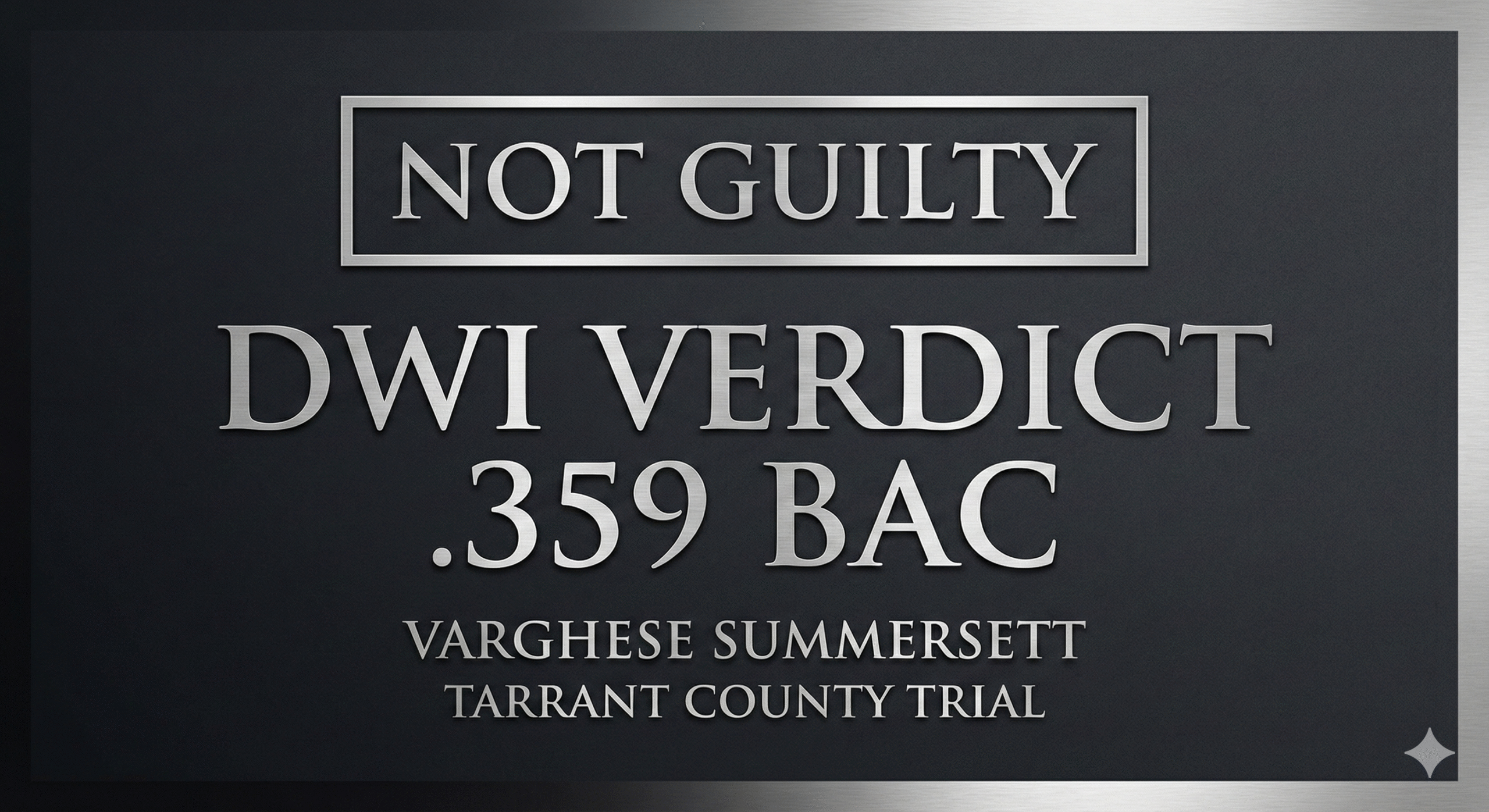Fort Worth DWI Attorney Serving All of Tarrant County
We have handled hundreds of Fort Worth DWI cases successfully. From dismissals to reductions and acquittals, we work hard to get you the best possible result if you are charged with a DWI. As Board Certified Criminal Specialists (Benson Varghese, Anna Summersett, and Letty Martinez), our team includes attorney who have earned the right to be called experts in the field. We’ve also gone to trial on every level of intoxication case – from misdemeanor DWI to felony intoxication manslaughter charges. In this article, our Fort Worth DWI lawyer will explain all the definitions of intoxication, how a person can be prosecuted for DWI, the implications of a DWI conviction, and of course, how to avoid a DWI in Texas – even after you’ve been arrested.
New Year’s Eve Update: Fort Worth Police are Stepping Up DWI Enforcement for NYE.
Significant DWI Jury Verdict from Varghese Summersett

Driving While Intoxicated Defense
Being charged with Driving While Intoxicated in Fort Worth, or anywhere in Texas, does not require an allegation that the driver intended to get behind the wheel while intoxicated. As a result, DWI charges are common. Our Fort Worth DWI lawyers have defended individuals from every walk of life who were arrested for a DWI – doctors, lawyers, pilots, nurses, firefighters, barbers, plumbers, even elected officials. If you or a loved one has been arrested for a DWI in or around Fort Worth, then this article is for you.
Fort Worth DWI Lawyer Located Near You
Our Fort Worth office is located just three blocks from the courthouse. We take up the entire seventh floor at the One City Place Building at 300 Throckmorton Street, Fort Worth 76102.
Why should you listen to us?
Before we get started, let’s talk about why we are an authority on DWIs, and in particular, DWIs in Tarrant County. First and foremost, we have tried more DWI cases to juries than almost anyone you’ll meet. The firm’s partners have tried over 300 DWI, Intoxication Assault, and Intoxication Manslaughter cases to juries in Tarrant County. To understand how adept we are at challenging evidence, it’s important to realize that 98 percent of DWI cases in Fort Worth are resolved through pleas. If there’s a weakness in a case, we will find it and leverage it for the best possible outcome. There’s no substitute for real-world trial experience when it comes to defending a case. The prosecutors know as soon as we walk in, that we’re coming in with vastly more experience than they have.
Take this result for example. You’d be hard-pressed to find a Not Guilty on a higher blood alcohol concentration by any attorney, anywhere: .359 BAC (over 4 times the legal limit).
Whether your case is one we take to trial, fight in a motion to suppress or negotiate a favorable outcome, we will be informative and transparent every step of the way. You’ll find that from our first conversation to the last, we are uniquely understanding, up-front, and talented. So let’s get to it.
Everything You Need to Know if You’ve Been Arrested for Driving While Intoxicated in Texas
What is a DWI in Texas?
A first-time DWI in Texas is, at the very least, a Class B misdemeanor, punishable by up to 180 days in jail. If you look up the definition of Driving While Intoxicated in Chapter 49 of the Penal Code, you’ll probably be surprised to see the definition makes no mention of the word “driving.” Instead, to prove a person was driving while intoxicated in Texas, a prosecutor must show the following:
- On or about a particular date
- The person accused
- “Operated”
- A motor vehicle
- While intoxicated.
Being “intoxicated” means:
- The person lacked their “normal” mental faculties due to an intoxicant;
- The person lacked their “normal” physical faculties due to an intoxicant; OR
- The person had a blood alcohol concentration of a .08 or more.
I put the word “normal” in quotes because that is not a defined term and is one reason why a case without a breath or blood specimen might be ripe for attack.
Notice that the first two definitions of being intoxicated are completely subjective, and you can be charged with being intoxicated on any substance – prescription drugs, illicit drugs, a combination of drug and alcohol, or just on alcohol alone.
We’ve defended every one of these types of DWIs in Fort Worth.
What is a DUI in Texas?
If you have never been arrested for DWI or known someone who has, you might find yourself using the terms “DUI” and “DWI” interchangeably. In fact, what we consider Driving While Intoxicated in Texas, is often referred to as Driving Under the Influence in other states.
In Texas, DUI is reserved for individuals under the age of 21 who are found driving a vehicle with any detectable amount of alcohol in their system. It is a Class C offense punishable by up to a $500 fine.
| Driving Under the Influence (DUI) | Driving While Intoxicated (DWI) |
|---|---|
| Applies to drivers under 21 | Age is not a factor |
| Charges stem from alcohol use only | Charges stem from any intoxicant, including alcohol, illicit drugs and prescription drugs |
| Class C Misdemeanor, punishable by a maximum $500 fine | Class B Misdemeanor, punishable by 3 to 180 days in the county jail |
| 60 day license suspension | 90 to 180 day license suspension |
| Section 106.041 Texas Alcoholic Beverage Code | Chapter 49.04, Texas Penal Code |
The Texan recently interviewed me to help explain how someone in Texas can be charged with Driving While Intoxicated – even if they are less than a .08. In fact, there are a number of ways this can happen. Most drivers in Texas are unaware that you can be prosecuted and convicted for a DWI at blood alcohol concentrations lower than .08 if one of the other two (and very subjective) definitions of intoxication are met.
We’ve become so adept at handling DWI cases in North Texas, we now also have a team of DWI lawyers in Dallas, in addition to the team in Fort Worth.
Fort Worth DWI Lawyer Benson Varghese walks you through how Varghese Summersett beats DWI cases in Tarrant County and North Texas in the video below.
How do you beat a DWI in Texas?
How can you get a DWI dismissed in Texas?
Our Fort Worth DWI lawyers have gotten more than our fair share of DWIs dismissed, acquitted, and reduced. The reason for this is two-fold: First, we have a tremendous amount of trial experience in DWIs. Second, we are adept at finding weaknesses in cases that other attorneys often overlook.
Outright dismissals are rare. From 2014 to 2019, there was an average of just over 5,000 misdemeanor DWI cases filed in Tarrant County each year. Of those, only about 100 cases were dismissed each year. Here are some of the top ways we’ve gotten DWI cases dismissed in Fort Worth.
Named Best DUI Lawyers in Fort Worth in 5 Years in a Row
In coming to this conclusion, Expertise.com noted we have represented individuals such as doctors, elected officials, and lawyers. Indeed, we are proud of the fact that we are the lawyers that lawyers call. They also give us top marks for Responsiveness, Friendliness, Helpfulness, and Detail. Finally, they found our 999+ 5-Star reviews on Google combined with the nearly 100 other top reviews on Facebook and Avvo to be compelling in awarding us this honor every year since 2021.

How to Beat a DWI in Texas:
Lack of Reasonable Suspicion to Detain
An officer has to have reasonable suspicion to stop you. Reasonable suspicion means the officer has “specific and articulable facts” that an offense has occurred. Officers sometimes get this wrong. Recently, we had a case where a driver was pulled over after not stopping before exiting a driveway at a shopping center. In this case, the sidewalk only extended on one side of the driveway, not both, which means the driver did not have to stop before leaving the parking lot. The officer got it wrong and we got the case kicked out. We have also had numerous instances in which a video negates the officer’s claimed basis for the stop.
Lack of Probable Cause to Arrest
An officer has to have probable cause to arrest you. This is a common area for us to attack. Most attorneys focus only on their client’s performance on the field sobriety tests. We have, however, had a number of cases where we got the results of the field sobriety tests kicked out because the officer administered the test wrong. It’s critical to do these tests right if a judge or jury is going to rely on them. (This is one of the reasons we advise people, before they are in this situation, to refuse field sobriety tests.) On top of that, a person’s “normal” may be different based on a number of factors including the time of day, amount of rest, and past or present medical conditions – none of which the officer is really taking into account in the field. If we can show the officer failed to properly develop probable cause to arrest you, we can get the evidence against you thrown out through a Motion to Suppress.
The Lack of a Breath or Blood Specimen
It is rare in Fort Worth, but every once in a while, we will see a case where the officer failed to get a warrant when a person refused to give a breath or blood sample. These cases are perfect to be attacked because the only evidence the prosecutors have is subjective.
Lack of Probable Cause in the Search Warrant for Blood
The affidavit for a search warrant for blood must also establish probable cause in order for the magistrate to allow for a blood draw pursuant to the warrant. If the warrant lacks probable cause, it can be attacked through a motion to suppress.
False Information in the Search Warrant
If the officer includes false information in the search warrant affidavit, the affidavit can be contested through a Franks Hearing. This is an evidentiary hearing to determine whether the officer intentionally or knowingly – or with reckless disregard for the truth – made false statements in his or her affidavit.
Improper Breath Test, Blood Draw, or Lab Techniques
We stay abreast of issues with labs, lab techs, problems with testing equipment locally, as well as testing procedures. We look for issues with the testing that could get breath or blood results kicked out – which we have done successfully on multiple occasions.
Intoxication at the Time – Not Later
If the police are able to determine you were operating a motor vehicle, the police will then investigate whether you were intoxicated at the time of operation. The passage of time is the most important factor in this situation. The more time there is between tests for intoxication and the operation of a vehicle, the harder it is to determine intoxication at the time of operation. As soon as you consume alcohol, your body will start to metabolize it. Depending on what time your last drink was, what else is in your stomach, how much you had to drink, what you had to drink, how much unabsorbed alcohol was in your system, and how much time passed between your last drink and the time of driving, your Blood/Breath Alcohol Concentration (BAC) may:
- Be higher at the time of driving than when you are test
- Be lower at the time of driving than when you are tested
- The same at the time of driving and when you are tested.
Further explanation: Retrograde Extrapolation
An experienced DWI lawyer will have access to experts in the field to determine if and how this “retrograde extrapolation” could be applied. It’s possible that you could have provided a sample over the limit even though you weren’t intoxicated when you were driving – an important distinction to make when trying to get your case dismissed.
Lack of Proof
Ultimately, a DWI case in Texas may be defeated by showing the State cannot prove the accusation beyond a reasonable doubt. This is typically done through a jury trial but can also be achieved by attacking the admissibility of evidence in pre-trial hearings.
What are the three standardized field sobriety tests in a Texas DWI investigation?
The three Standardized Field Sobriety Tests (SFSTs) commonly used by law enforcement officers are:
- Horizontal Gaze Nystagmus (HGN) Test: As mentioned in the previous message, the HGN test involves observing the eyes of a suspect as they follow a slowly moving object such as a pen or flashlight, horizontally.
- Walk-and-Turn (WAT) Test: In the WAT test, the subject is directed to take nine steps, heel-to-toe, along a straight line, and then turn on one foot and return in the same manner in the opposite direction. This test is designed to measure a person’s ability to follow directions and remember a series of steps while dividing attention between physical and mental tasks.
- One-Leg Stand (OLS) Test: In the OLS test, the subject is asked to stand with one foot approximately six inches off the ground and count aloud by thousands (One thousand-one, one thousand-two, etc.) until told to put the foot down. The officer times the subject for 30 seconds. The test measures the subject’s ability to perform a simple physical task while following instructions.
Field Sobriety Tests Explained
What Are Field Sobriety Tests in Texas?
Field sobriety tests are physical and mental exercises police use during traffic stops to help determine if a driver is impaired. If you’ve been pulled over and asked to perform these tests, you’re probably feeling anxious and unsure of your rights. Here’s what you need to know: field sobriety tests are voluntary in Texas, and the results are often far less reliable than officers suggest.
The Three Standardized Field Sobriety Tests
The National Highway Traffic Safety Administration (NHTSA) recognizes only three standardized field sobriety tests (SFSTs):
Horizontal Gaze Nystagmus (HGN): An officer moves a stimulus (usually a pen or finger) in front of your eyes, watching for involuntary jerking. This test is considered the most reliable of the three, yet studies show it’s only accurate about 77% of the time under ideal conditions.
Walk-and-Turn: You’re asked to take nine heel-to-toe steps along a line, turn, and take nine steps back. Officers look for eight possible “clues” of impairment, including losing balance or stepping off the line.
One-Leg Stand: You must stand on one foot for 30 seconds while counting aloud. Officers watch for swaying, hopping, or putting your foot down.
Why Field Sobriety Tests Are Unreliable
These tests were designed in the 1970s and have significant flaws. Medical conditions, age, weight, footwear, road surfaces, weather, and even nervousness can cause a completely sober person to “fail.” The NHTSA’s own research shows that even when all three tests are administered correctly, they only predict impairment 82% of the time combined.
At Varghese Summersett, our DWI defense attorneys have successfully challenged field sobriety test results in hundreds of cases. In one recent Tarrant County case, our team demonstrated that a client’s poor performance on the walk-and-turn test resulted from an old knee injury, not intoxication. The charges were dismissed.
Your Rights During a Texas Traffic Stop
Many drivers don’t realize they can legally decline field sobriety tests in Texas. Unlike chemical tests (breath or blood), there’s no automatic license suspension for refusing SFSTs. However, officers rarely inform you of this right.
If you’ve already taken these tests and were arrested for DWI, the results aren’t necessarily the end of your case. Experienced defense attorneys know how to challenge improper administration, environmental factors, and officer training deficiencies.
Protect Your Future
A DWI conviction in Texas carries serious consequences: jail time, fines up to $2,000 for a first offense, license suspension, and a permanent criminal record. But an arrest doesn’t have to become a conviction.
Our team at Varghese Summersett includes former prosecutors and board-certified criminal law specialists who understand how to attack weak evidence, including questionable field sobriety test results. If you’re facing DWI charges, talk to an attorney before making any decisions about your case. Call us at 817-203-2220 for a free consultation.
What are the elements of a DWI in Texas?
If you look up the definition of Driving While Intoxicated in Chapter 49 of the Penal Code, you’ll probably be surprised to see the definition makes no mention of the word “driving.” Instead, to prove a person was driving while intoxicated in Texas, a prosecutor must show the following:
- On or about a particular date
- The person accused
- “Operated”
- A motor vehicle
- While intoxicated.
Why is there such a big range in the cost of DWI attorneys?
The greater demand there is for a particular attorney, the higher their prices are going to be. What creates a high demand for a DWI lawyer? More than anything else, trial experience, particularly if that trial experience is in the county where you are charged with a DWI.
What is the punishment for a first-time DWI in Texas?
| Driving While Intoxicated | 3-180 days in jail, up to $2,000 fine |
| Driving While Intoxicated BAC >/= .15 | 0-365 days in jail, up to $4,000 fine |
| DWI – Child Passenger | 0-2 years in State Jail, up to $10,000 fine |
| Intoxication Assault | 2-10 years in prison, up to $10,000 fine |
| Intoxication Manslaughter | 2-20 years in prison, up to $10,000 fine |
What Are The Possible Outcomes For A First-Time Misdemeanor DWI In Texas?
- You may be sentenced to up to 180 days (Class B misdemeanor) or 1 year (Class A Misdemeanor which is the .15 or greater offense).
- You may be granted up to two years of deferred adjudication on a Class B misdemeanor.
- You may be granted up to two years of probation on a Class A or Class B misdemeanor.
- If your case has significant legal issues, your charge might be reduced to Obstruction of a Highway.
- If your case has a legal issue that results in the judge throwing out evidence, your case may be dismissed.
How Likely Is Jail Time For A First DWI?
Every DWI in Texas starts with an arrest before the case is formally filed with the District Attorney’s Office. Depending on what county you are in, you may bond out quickly, in a matter of hours, or in a matter of days. Once you have bonded out, however, if you follow your attorney’s advice, the chances of staying out of jail as punishment for the charge are very good on a first-time misdemeanor DWI charge.
How Much Does A First-Time DWI Cost?
A first-time DWI, after attorney costs, license fees, fines, court costs, probation fees, class fees, increased insurance rates, etc, can easily set you back $15,000 to $20,000.
What Should You Expect If You Are Arrested For A DWI In Texas?
After you are placed under arrest, the officer will ask you for breath or blood. If you refuse, the officer will likely (but not always) seek a warrant for your blood. If the officer gets a warrant, don’t fight the blood draw – we can fight the results in court.
You will be taken back to jail after the blood draw (which usually happens in a hospital) and a bond will be set. This might be a monetary bond, or you might be released on personal recognizance. You will have bond conditions to live by, ranging from not drinking alcohol while the case is pending to having an ignition interlock device on your vehicle while the case is pending.
What’s An ALR Hearing In A DWI Case?
An Administrative License Revocation hearing is a hearing at which an Administrative Judge (so not the judge on the criminal case) hears evidence as to whether your license should be suspended. It does not require a conviction and in most cases it doesn’t even require proof that you were in fact intoxicated. Learn more about ALR hearings here: watch this ALR video.
Is A DWI A Misdemeanor Or Felony In Texas?
A first-time DWI is generally a misdemeanor in Texas. Typically a first-time DWI will be filed as a Class B misdemeanor. This charge can be enhanced to a Class A misdemeanor in Texas if the blood alcohol concentration (at the time of testing) was a .15 or greater.
A first-time DWI can actually be filed as a felony in Texas if there is a child passenger in the vehicle.







